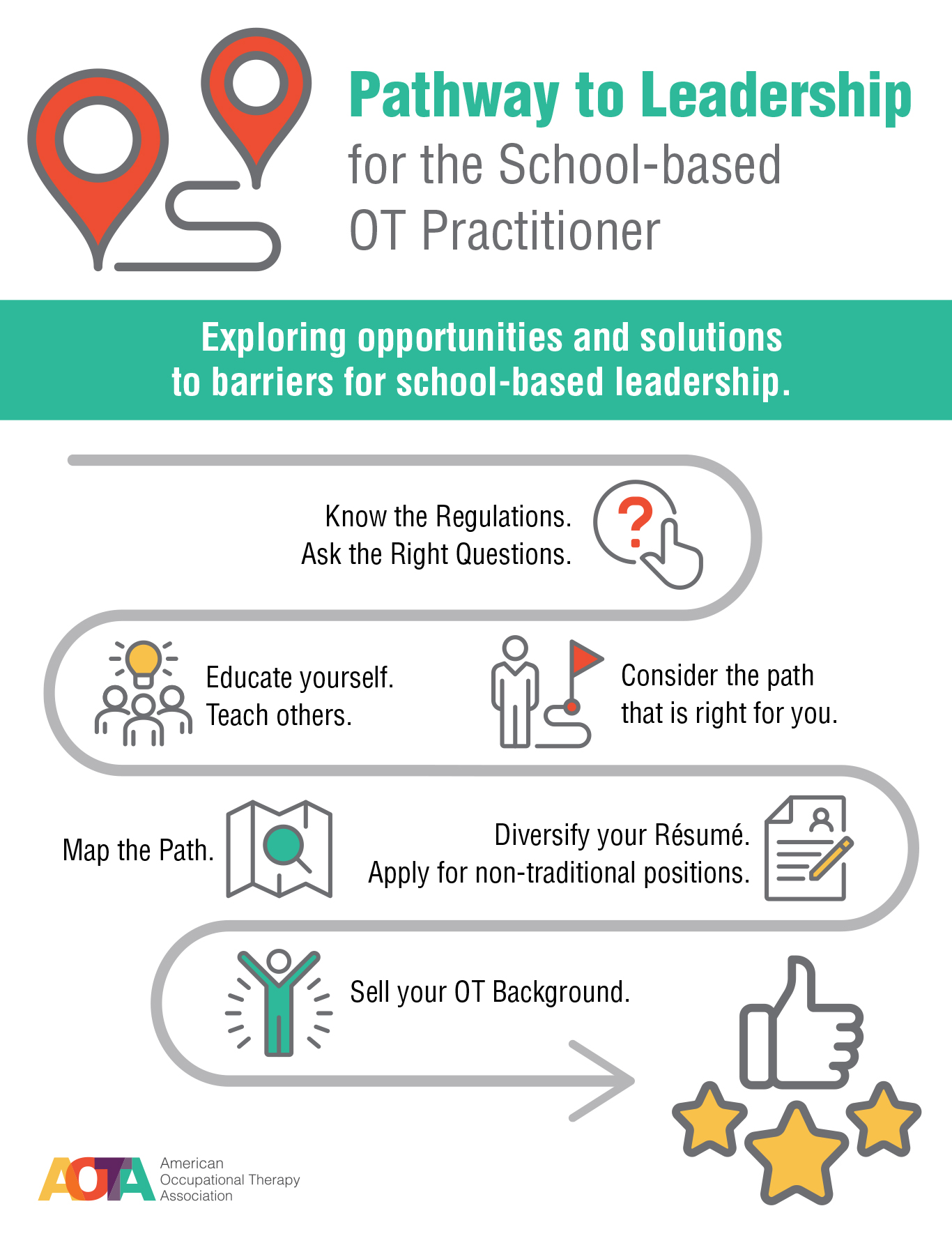School-based leadership
Path to leadership for the school-based practitioner
Chart your own course
Understand your options and develop a plan that works for you.
Download the Pathway to Leadership Infographic

Getting started in school-based practice? Know the regulations. Ask the right questions.
When starting the search for a position in the school system, be sure to know the regulations related to leadership in your state and district. It is also important to ask the right questions during the interview process. Consider asking these questions:
Work environment
- Where is the occupational therapy practitioners’ (OTPs') designated workspace? May I see it?
- In terms of workspace, is there parity between staff?
- Please explain the overall departmental culture. What do OTPs enjoy about working here? How often is there an opportunity to meet as a department?
Professional development activities
- What types of opportunities are available to OTPs beyond one-on-one direct treatment? For example, can OTPs join school-based committees?
- Do OTPs participate on district-wide local education agency (LEA) initiatives (e.g., curriculum committee, wellness committee)?
Interprofessional teams
- Is participation on various teams welcomed (e.g., multi-tiered system supports, student services intervention team, preschool screening team, crisis team, assistive technology team, positive behavioral interventions and supports (PBIS) team, transition team, wellness team)?
- Does participation count as paid time?
Personnel parity
- Do OTPs belong to a union? If yes, will the union place me with other like professionals (e.g., social workers, teachers)?
- Please explain the OTPs' pay scale and compensation package compared with teachers and other staff such as social workers, speech therapists, and physical therapists.
- Discuss parity related to other personnel. Does the OTP have planning periods similar to those of teachers, speech language pathologists, and social workers? Is mentorship available? Is continuing education funded? Do OTPs have access to or a budget for technology, equipment, and materials?
OT/OTA performance evaluation
- Explore how OT practitioners are evaluated.
- Consider whether the evaluation tool is specific to the performance of an OTP.
- Consider whether the evaluation is performed by an OTP, teacher, or other related professional.
Educate yourself. Teach others.
- Consider the potential opportunities and challenges to leadership in the school systems.
- Teach OT and OTA students about challenges, opportunities, and pathways to leadership in the school setting.
Consider the path that's right for you.
- Team leadership roles
- Content expert
- Committee member or chair for district-wide or LEA initiatives (e.g., curriculum, wellness, program development)
- Member of the multi-tiered systems of support team
- Preschool screening team
- Crisis and mental health team
- Assistive technology team
- PBIS team
- Transition team
Supervisory and administrative leadership roles
- Supervisor of other OT practitioners
- Supervisor of related services providers/specialized instructional support personnel
- IEP team leader
- Compliance officer
- School team technical assistant
Map the path.
- Learn how to get there; seek mentorship and peer support.
- Use CommunOT to post questions and read others’ stories.
- Research administrative leadership positions in public schools.
- Create a professional development plan.
- Attain your professional development goals, have a leadership mindset, say yes to diverse opportunities, and engage in continuing education.
Diversify your résumé. Apply for nontraditional positions.
- Gain experience and frame your skill and skillset to fit the context.
- Market skills that you've gained as an OT that are not specific to OT service delivery.
- Join national and state associations. Consider joining other associations and groups related to school boards, education, or quality and compliance.
- Explore advanced certification and digital badges.
- Join or volunteer for nonprofits and or advisory boards in the areas that reflect your interests.
Sell your OT background.
- Speak at your local Parent and Teacher Association (PTA) about what OTPs can do, and where help is needed.
- Gain support from administrators, colleagues, and students' parents or caregivers to expand the role of OT.
- Provide a clear picture of how an OTP can make unique contributions to the interprofessional team (e.g., literacy) or in program development (e.g., bullying prevention programs).
- Explain how OTPs can provide services across multitiered systems of support and address the needs of the whole school population.
- Create and practice your OT elevator pitch.
- Create and practice a pitch that demonstrates the vast knowledge and skills that OTPs possess and why OTPs are prepared for school leadership.
- Provide resources explaining the role of the school-based OTP to school administrators.